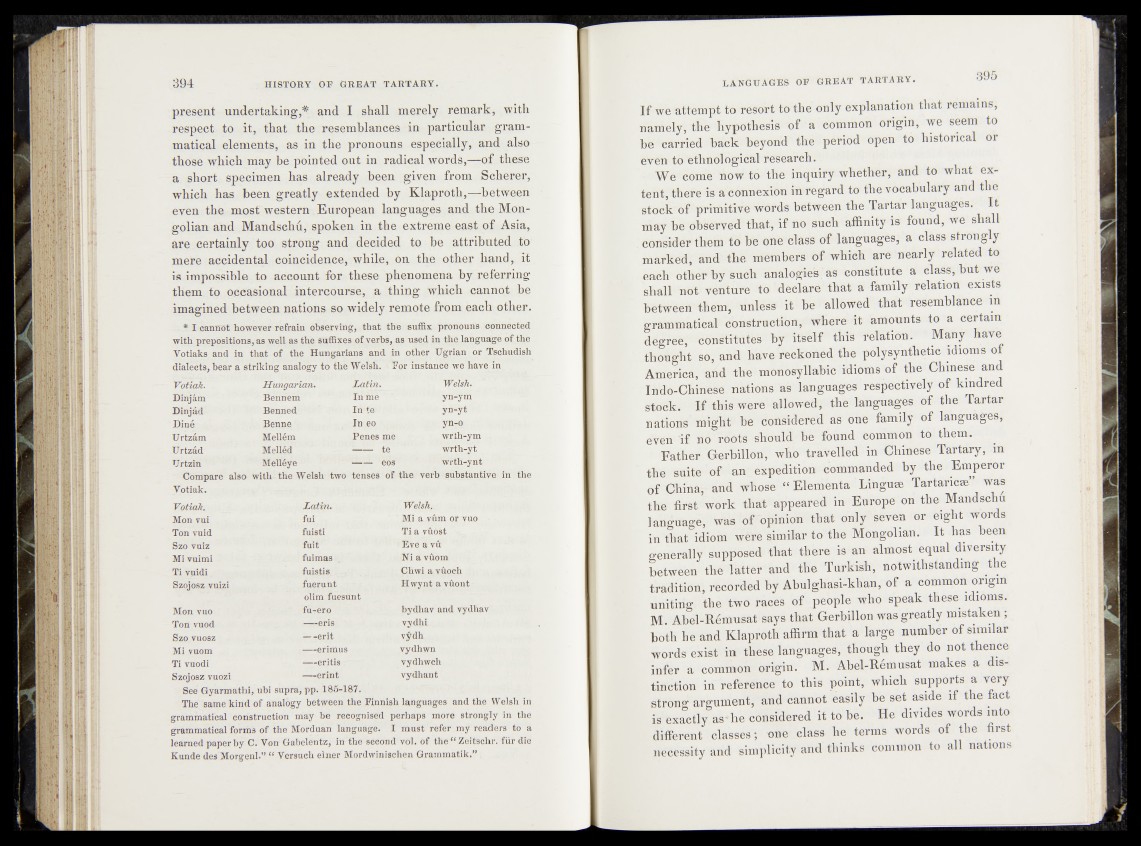
present undertaking,* and I shall merely remark, with
respect- to it, that the*.Resemblances in particular grammatical
elements, as in the pronouns especially, and also
those which may be pointed out in' radical woi$s,—of .these
a short specimen has already been given from Scherer,
which has been greatly extended by Klaproth,—between
even the most western European languages and the Mongolian
and Mandschd, spoken in the extreme east of Asia,
are certainly too strong and decided to be attributed .to1
mere accidental coincideneei while, on the other hand&Sj|.
is impossible to account for these phenomena by Referring
them to occasional intercourse, a thing which cannot bp
imagined between nations so widely remote from, each other.
* I cannot however refrain observing, that the suffix pronoun's connected
with prepiositions, as well as the suffixes of verbs, as used in ^ e language of the
Votiaks and in that of the Hungarians and in other Ugrjan ^or Tschudish
dialects, bear a striking analogy to the Welsfi. instance we have fn^ v
Votiak. Hungarian. Latin. Welsh. '
Dinjâm ' Benném ' l§Mg | yiî-fm ‘ ■'
Dinjàd Benned In-te yn-yt *
3>lné .. Benne In.eo .
Urtzâm Mellém Penes me wx tié-ym ,,
Urtzâd Mellêd I----- wrth-yt
TJrtzîn MeÏÏéÿe P wi-th-ynt
Compare also with the Welsh two
tenses of the*> vèrb ^substantiv®
Votiak.
Votiak. Latin. Welsh..
Mon vuf fui - Mi A-yûm or vuo. •
Ton vuid fuistl Ti a vûôst \
Szo vuiz fuit ?Êve a vû
Mi vuimi fui mas 4fi a vûom
Ti vuidi. fuistis. I» Chvp a vûoeh
Szojosz vuizi fuerunt
olim fuesunt
Hwynt a vûoufc -
Mon vuo furèro 1 bydhav and vydhav’
Ton vnod —-eris vydhi
Szo vuosz —-erit vÿdh.
Mi vuom . -— erimus vydhwn
Ti fuodl — eritis vydhwch
Szojosz vuozi — erint vydhant
See Gyarcnathi> uhi supra, pp. 185-187.
The same kind of analogy between the Finnish languages and the Welsh in
grammatical construction may be recognised perhaps more strongly in the
grammatical forms of the Morduan language. I must refer my readers to a
learned paper by C. Von- Gabeldbtz/ in the second vol. Of thef< Zeitscht. für die
Kunde des Morgenl.”-“ Yersuch einer Mordwinischen Grammatik.";
If to-resort to the only explanation that remains,
namely, the h y p oA te ^ o f‘a common origin, we seem to
be carried back beyMH thé period open to historical or
eveîr to ’ethnological research. ‘
Wètfêtó^now tb^tfté' -inquiry whether,' and to what 'esf-
tent, there is abónnexibn irt-regard to the vocabulary and the
stock o f primitive words between the Tartar languages. It
may %b:öbserved that, if no sù-éh affinity is found, we shall
consider them to he onekdass of languages, a class strongly
marked, and the members of which are nearly related to
each"-atïèHsy such analïd^èkf-as constitute a class, but we
shâM not ve#t‘u¥e to déclaré'that a family relation exists
between them, ^ n l é ^ it be allowed that resemblance m
grammatical construction, whereat amounts to a certain
degree,--cöiistitute^by itself this relation!- Many have,
thoöght so, and have reckoned the polysynthetic idioms of
America, ^bd the monosyllabic idioms of the Chinese and
Indo-Chinese nations as languages respectively of kindred
stock. If this were allowed, the languages of the Tartar
nations might he considéféd as one family of languages,
even if no roots should be found common to: them;
Fathë# Gerhillotfi who travelled in' Chinese Tartary, m
the suite of an expedition -commanded by the Emperor
éf Chinar and whose-' “ Elemënta Linguæ Tartaricæ” was
the first work that appeared in Europe on the-Mandschu
language, was of opinion that only seven or bight words
in that idiom wëfiè sîhiilar to the Mongolian. It chas keen
generally supposed that there is an almost equal diversity
between the latter and the Turkish, notwithstanding the
tradition, recorded by Abulghasi-khan, of a common origin
uniting the two races of people who speak these idioms.
M. Abèl-Rémusat says that Gerbillon was greatly mistaken ;
both he and Klaproth affirm that a large number of similar
words exist in these languages, though they do not thence
. infer a common origin. M. Abel-Rémusat makes a distinction
in reference to this point, which supports a very
strong argument, and cannot easily he set aside if the fact
is exactly as*he considered it to be. He divides words into
different classes; one class be terms words of the first
necessity and simplicity and thinks common to all nations